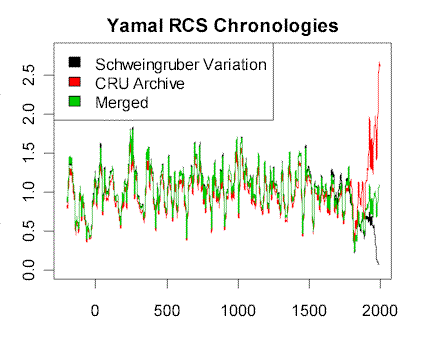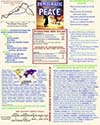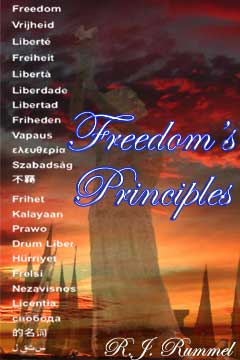 On the Democratic PeaceON FOREIGN POLICY
On the Democratic PeaceON FOREIGN POLICYI have shown the historical progress in foreign policies (both international and American) (see
here) and the context—the nature of international relations – of such policies (see
here). These have evolved through international conferences, which reset the status quo after the Napoleonic Wars and adjusted power relations to the facts of colonization; the focus on international organizations, such as the League of Nations, and law after World War I; and the rise of the theory and practice of political realism after WWII. These were all attempts to keep the peace and avoid war. When war occurred, new and hopefully better peacekeeping policies were created. Such policies (really new paradigms) often originated from the research and writing of scholars, practitioners, and international lawyers and experts.
During WWI, President Wilson argued that the war was going to make the world safe for (and thus spread) democracy. This notion was Europe centered and when the League of Nations died, so did the idea in American foreign policy. It was an anomaly with little support in the international relations scholarship of the time, even though Wilson had been a Professor of Political Science.
With the defeat and military occupation of Japan, Germany, and Italy in World War II, the question was what to do with these former enemies. Democratizing them was the controversial answer of the Truman Presidency, despite the strong academic belief that Japan, an Asian country with a long history of absolute authoritarianism, could not become a democracy. Democratization answered the immediate problem but did not become a rule of foreign policy at that time. Containing communism and the Soviet Union was the rule in 1948, and became entrenched along with the political realist paradigm.
In the later 1980s, with the successful democratic transformation of former enemies, during the presidency of George H. W. Bush the idea of spreading democracy penetrated realism. Not front and center, but it was there and followed when the opportunity to promote democracy occurred. This idea was criticized by realists as idealistic, a return to Wilsonianism.
In the meantime, theoretical and empirical research on the democratic and peace had reached extraordinary conclusions (see
on the democratic peace and its bibliography here). Democracies do not make war on each other, and are a way to world peace. This was accepted by Bush’s successor, President Bill Clinton, who thus made democracy promotion one of the three pillars of his foreign policies (the two others were trade, and the use of force when necessary) and a major focus. He made clear the reason was that historically there is no war between democracies (see
here)
President George W. Bush, apparently equally impressed by the research on the Democratic Peace, made the democratic peace his Forward Strategy of Peace (see
here). It was the basis of his policy. He saw that promoting democracy—freedom—is the way to world peace, and in the fundamental national interest. Realists hated it. It was Wilsonianism reborn, and dangerous; they mistakenly thought it led to forcing democracy on other nations and thus conflict, violence, and war. But Bush and his Secretary of State Rice, stuck to it throughout his administration.
Realists often claim that Bush failed in promoting democracy; there was more democracy in the world when he became president than when he left it. Let us check this using the
freedom ratings by Freedom House. For the period of Bush’s two terms, those nations whose rating improved to be the best for Freedom—a rating of 1—went from 29 to 50 in number, almost doubled. The number of electoral democracies remained at 121, and the number of free nations—with a rating of 1 or 2, and sometimes 3—decreased from 91 to 90. To best see the overall change, I averaged the ratings for all nations, and found that for political rights and civil liberties (which range from 1 to 7), those for Bush’s term went from 3.47(last year of Clinton’s presidency) to 3.26 for Bush’s last year. Considering that this is for all 193 nations, the change is significant. Bush’s Forward Strategy Of Peace did promote democracy in the world. Also note that Iraq (rated 6) and Afghanistan (rated 5) are not counted yet among the democracies.
ON PRESIDENT OBAMA’S FOREIGN POLICYTo characterize Obama’s foreign policy, let’s look at its major elements.
- He apologizes to friends and enemies for past American foreign policy and actions, while ignoring the good that America has done, such as the Marshall Plan, economic aid, being the world’s major source of disaster relief, saving and freeing nations from communism, and democratizing Japan, Germany, and Italy. Also saving a million lives in Somalia and saving Muslim Bosnia and Kosovo; and freeing Kuwait and Iraq from Saddam Hussein’s rule, and Afghanistan from the Taliban, while aiding the constitutional democratization of both.
- He placates and supports dictators and authoritarian “democrats,” such as Chavez of Venezuela, Mahmoud Ahmadinejad of Iran, Manuel Zelaya of Honduras, Evo Morales of Bolivia, Vladimir Putin of Russia, and Hu Jintao of China, among others
- He firmly believes in the thug ruled and failed UN and wants to support and use it as much as he can.
- He believes in the smile and jaw-jaw approach to conflicts and enemies, such as North Korea and Iran. His administration has scheduled to meet with both, even one-on–one, without, to my knowledge, any preconditions.
- He has clearly sided with the Palestinians against Israel, including giving aid to Hamas and making demands on Israel that favor of the Palestinians.
- He has cut funds for missile defense, cut the defense budget overall, and has decided not to build missile defenses in Poland and Czechoslovakia against Iran as a carrot for better relations with Putin. He refuses to fund an upgrade in our nuclear weapons.
- He is anti-nuclear proliferation to stable democracies, although nukes would help defend them.
- He has set a deadline for withdrawal from Iraq and ending the Iraq War on August 31, 2010, but will leave a force of 35,000 to 50,000 troops.
- He is clearly reluctant to increase American troops in Afghanistan for fear of world criticism.
- He has changed the “War on Terror” to “Overseas Contingency Operation.” He says we are not fighting terrorists but al Qaeda, and that fight being our near total focus.
- He has used the 9/11 anniversary, the memorial day to honor the innocent and the brave who perished at the hands of terrorists, to promote “community service.” 9/11 is simply another day to move his agenda.
- He is now treating incarcerated terrorists as criminals, with all the rights of American criminals. At one point, some were read their Miranda rights when captured. Also torture, regardless of the immediate need to save lives, has been forbidden. Thus, he has changed a War on Terror to a police action as in pre-9/11. He is unnecessarily closing Guantanamo detention camp by January 22, 2010 as a sop to world and domestic leftist opinion.
- He is a trade protectionist if so demanded by American unions.
- He is pursuing the legal prosecution of those CIA agents that used “torture” on terrorists, although done under the guidance of the Department of Justice, thus undermining intelligence operations.
Where is democracy and human rights in all this? They do pop up occasionally in some of his speeches, but are not central to his foreign policy. Then what is? They are “the “three D’s” of defense, diplomacy, and development, with the emphasis being on diplomacy with friends and enemies, or the use of “soft power”. This is clearly a bow to the realist’s belief in diplomacy, but ignores what also should be a focus on hard power and power balances.
The democratic peace? Gone. Dead. If he has said anything, I could not find it. In this, he a 1960’s anti-war, socialist-radical activist. These radicals believed in love not war, that peace can be had by actively opposing American policies and hands across the seas.
So given all this, how do I characterize the Obama foreign policy? Not soft power, not smart power, not political realism. Might it be then to pacify or placate friend and enemies in what he calls the world community? Yes.
Is it then also to satisfy demands of friends and enemies? Yes
Is it moreover to relieve guilt about America’s past behavior? Yes.
And is Obama making concessions at the expense of realism? Yes.
Then his foreign policy is one of
appeasement and appeasement is the way to characterize it.































